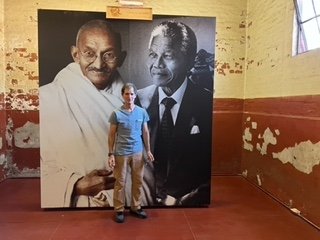
Blog.

Paul with a couple of his heroes in Johannesburg, South Africa.
View Paul’s columns here:
LAST WEEK, I WAS ESPECIALLY GLAD we had our four-wheel-drive van jacked up four inches and fitted with steel plates under the chassis to protect the gas tank. Why? Because the “roads” shown on the GPS in this corner of South Africa turned out to be gravel paths with large rocks and ditches, as well as goats, sheep, and people to navigate around. The GPS signal also got so weak, I wasn’t sure we would get where we were supposed to go.
TWO BOOKS SIT ON MY BOOKSHELF: One is titled Living Without a Goal. The other champions living with a goal. Both books have meaning in my life. Obsessing over goals often messes up relationships and means not smelling the roses or not being open to new experiences (unless that is your goal). But living without a goal—following the butterflies of our muses from flower to flower—also messes up relationships and leaves us going nowhere to look back from.
WHEN I WAS IN HIGH SCHOOL, I wrote a poem titled “Why Is This” that ended with the question, Why is this? The poem was just another assignment in English class, but I still remember it because for the rest of the year whenever my English teacher would make a point, he would smile and look at me until I squirmed and then ask the class, “Why is this?” It spread like a pandemic. Soon friends (and then some) ended conversations with me by loudly asking, “Why is this?” Emotions help us remember.
“AND SEAL THE DOOR WHERE EVIL DWELLS.” This line from Alice Bailey’s Great Invocation of 1945 came to mind as I walked around the twisted steel and rubble at Ground Zero of where the atomic bomb dropped on Hiroshima, also in 1945. The bomb missed its intended target of a bridge and hit a hospital a few hundred meters away. The line came to mind again in Okinawa, where a quarter of the civilians were killed not only by the allied war efforts but by the Japanese military that needed their resources.
WHILE ESTABLISHING AN OFFICE for my financial company, we lived on Maui—heaven on earth—for a few years. We enrolled our kids in the local Steiner Waldorf school and joined a small local church. We were consistent churchgoers, and both Amy and I became Sunday school teachers. Maybe it was our commitment to the community and volunteering that made for such a lovely, connected experience. Or maybe it was the loving community that accepted us and embraced us because we showed up. Either way, the connection and feeling of belonging was meaningful for my family.
I AM AN OLD, WHITE AMERICAN living in South Africa. In Africa, I am seen by many here as a “White,” part of an evil tribe that took the land, culture, and souls of the continent’s original settlers; a tribe that makes me privileged over the world just because I am white. Now, restitution rages as an idea whose time has come, and an increasingly common belief is that anyone with non-native ancestors and some economic status—especially white people— owes something to those whose ancestors would be considered of the local tribe. I have been asked what I think about it.






